Metal like any addiction sends us toward the next more intense experience by necessity. When we cannot find the rush in metal, we turn to other genres, but few of those satisfy. Metalheads often find themselves tempted by classical music, but shy away for a number of reasons.
Classical music requires greater attention to recording, conductor and year than do rock-style albums where artist name and album name will suffice. The choice of which of those to get appears at first baffling and ambiguous. The classical community can be a big help, but on the internet, fans of every stripe tend to have a holier-than-thou outlook which drives away others. Finally, classical cannot compete sonically with metal which is a constant delighted terror of high-intensity guitar.
For those who want to branch outward however, classical offers an option which resembles metal under the surface even if from a distance it appears the opposite. Classical music like metal is riff-based and knits those riffs together into compositions which transition between multiple emotions and forms to tell a story, unlike pop which is more cyclic if not outright static. It also embraces the same Faustian spirit of rage for order that defines metal.
The brave few might want to forge ahead with these albums which serve as good entry works to classical:
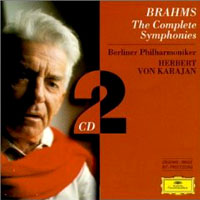 Brahms, Johannes – The Four Symphonies
Brahms, Johannes – The Four Symphonies
Pure Romanticism, which is the most beautiful classical genre but also its most easily misled into human emotional confusion. Flowing, diving, surging passages which storm through tyrannical opposition to reach some of the most Zen states ever put to music.
Four Symphonies by Herbert von Karajan/Berliner Philharmonik Orchestra
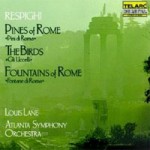 Respighi, Ottorino – Pines, Birds, Fountains of Rome
Respighi, Ottorino – Pines, Birds, Fountains of Rome
Italian music is normally inconsequential. This has an ancient feeling, a sense of weight that can only be borne out in an urge to reconquest the present with the past.
Pines, Birds, Fountains of Rome by Louis Lane/Atlanta Symphony Orchestra
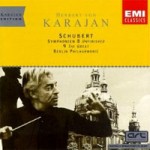 Schubert, Franz – Symphonies 8 & 9
Schubert, Franz – Symphonies 8 & 9
A sense of power emerging from darkness, and a clarity coming from looking into the halls of eternity, as translated by the facile hand of a composer who wrote many great pieces before dying young.
Symphonies 8 & 9 by Herbert von Karajan/Berliner Philharmonik Orchestra
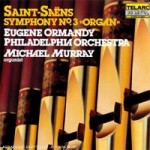 Saint-Saens, Camille – Symphony 3
Saint-Saens, Camille – Symphony 3
Like DeBussy, but with a much wider range, this modernist Romantic rediscovers all that is worth living in the most warlike and bleak of circumstances.
Symphony No. 3 by Eugene Ormandy/Philadelphia Orchestra
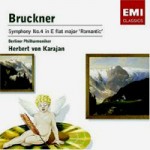 Bruckner, Anton – Symphony 4
Bruckner, Anton – Symphony 4
Writing symphonic music in the spirit of Wagner, Bruckner makes colossal caverns of sound which evolve to a sense of great spiritual contemplation, the first “heaviness” on record.
Romantic Symphony by Herbert von Karajan/Berliner Philharmonik Orchestra
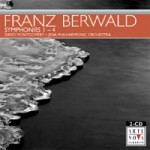 Berwald, Franz – Symphony 2
Berwald, Franz – Symphony 2
The passion of Romantic poetry breathes through this light and airy work which turns stormy when it, through a ring composition of motives, seizes a clear statement of theme from its underlying tempest of beauty.
Symphony No. 2 by David Montgomery/Jena Philharmonic
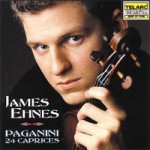 Paganini, Niccolo – 24 Caprices
Paganini, Niccolo – 24 Caprices
Perhaps the original Hessian, this long-haired virtuoso wore white face paint, had a rumored deal with the devil, and made short often violent pieces that made people question their lives and their churches.
24 Caprices by James Ehnes
 Anner Bylsma and Lambert Orkis – Sonatas by Brahms and Schumann
Anner Bylsma and Lambert Orkis – Sonatas by Brahms and Schumann
We list these by performer because this informal and sprightly interpretation is all their own. Played on period instruments, it captures the beauty and humor of these shorter pieces with the casual knowledge of old friends.
Brahms: Sonatas for Piano and Cello; Schumann: 5 Stücke im Volkston
Not everyone will take this path. Where metal, pop, rock, blues, techno, hip-hop and jazz aim for a consistent intensity, classical varies intensity as it does dynamics and mood. The point of listening to classical is to let it take you on an adventure, which much like metal will at some point encounter a crashing conclusion in which all things vast, powerful and beyond our reach come to bear on us for the ultimate feeling of heaviness.
Tags: anner bylsma, anton bruckner, berliner philharmonik, camille saint-saens, Classical, franz berwald, herbert von karajan, johannes brahms, lambert orkis, niccolo paganini, ottorino respighi, robert schumann
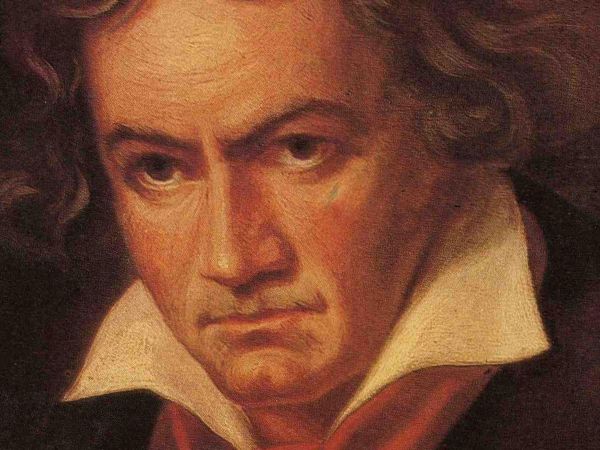


I’m surprised you left Mendelssohn out of this list.
Mood, “tremolo picking” and northern imagery is there.
You can hear of lot of his in early Satyricon if you listen closely.
The dark and heavy moods of Mahler’s 2nd and 7th symphonies could appeal to metalheads. Georg Solti and the Chicago Symphony did a great job with it.
Mahler: 2nd movement of 5th symphony
Good to see this article recycled. I still don’t understand Saint-Saëns being ‘Like DeBussy, but with a much wider range’ though. He lacks that which Debussy specialized in: the nebulous mystery, the shades of colors you didn’t know existed.
Some other safe recommendations as far as Romanticism is concerned:
Beethoven 5th – Kleiber/VPO
Bruckner 9th – Giulini/VPO
Schubert – String Quintet – Alban Berg Quartet/Schiff
Agreed on Debussy and Saint-Saëns. SS is very competent, but pretty “showy” and has little substance, IMHO. Debussy may not have had a wide range (whatever that means), but was the last original composer with something to say.
Sergei Prokofiev has some very black-sounding moments. I don’t have my music collection handy so I’ll have to post later the name oof the piece I’m thinking of specifically. Lots of minor melodies, very fluid but still stark, generally a feel of cold and isolation, introspective without being indulgent. Again, sorry for not being able to point to a specific piece, but I will post again later with the name.
good article . smart to include Paganini!
Indeed. Theatrics aside, the music holds up. I have an album of piano versions of Paganini’s 24 caprices and it is great.
Is it only me, or is Brahms not as good as he seems at first?
He has some great ideas and some unique, powerful themes, but he’s pretty bad at developing them. The themes twist and turn, but add no energy, so at the end of a piece it feels like we’ve gone nowhere. I think this adds a slightly sentimental ring to many of his themes.
Perhaps he was simply too comfortable with the Romantic style shaped by Beethoven much earlier.
I haven’t thought deeply about this but Brahms resonates very much for me, and I understand your criticism, especially if you added Beethoven as a comparison on how to develop themes.
Beethoven’s main strength wasn’t melody of the theme itself, but development, which he was maybe the greatest of all time (take Beethoven’s 5th for example, every theme is a variantion on the first very simple subject.)
Comparing that strength against Brahms makes the latter seem weak and on a lesser caliber of genius (perhaps a hair so). But I would argue that Brahms’ thematic material was far stronger than most of his Romantic contemporaries, and his reliance on classical sonata form becomes a strength because it focuses and organizes his ideas in an Apollonian way. He may not transition as well, but this weakness seems a bit overstated when arguing that his music has ‘gone nowhere.’ I never fail to feel transported an on a ‘musical journey’ with Brahms, as I often am lost with many Wagnerian composers whom are much more [i]less organized[/i] in their apparent ‘liberation’ from formal structures.
I’m with you on this: Beethoven is superior when it comes to modulation and it may serve little purpose to compare Brahms to him.
But I must say I haven’t noticed this Brahmsian “staleness” in any other composers. As for his reliance on sonata form, I come to think of Mozart’s 40th (1st movement). I think it’s a great example of how “block-y” a composition can be and is nevertheless continually infused with energy. The typical Brahms piece (it seems to me) has striking moments, but gives a tired impression.
As is apparent, I am unable to express myself any better than this and my negative experience with Brahms so far may be unfounded. I’ll get back to you in five years. ;)
Brahms strikes me more as pure Romantic with some modernist tendencies, in that his goal seems to be to dive into a theme and then bring out richness in it, where Beethoven is more about the transition between themes and forced context changes. Brahms is more like doom metal, Beethoven more like fretboard wizard death metal.
More like power metal.
Comparing Beethoven to power metal is beyond ignorant.
Although Beethoven indulges in virtuosic sections on piano works and there a large improv-induced character to his music, this is a master of structure.There’s a lot of smoothness to his transitions when he wants them to be smooth. It’s abrupt when he requires it. But I can understand your comparison.
I think his opus 133 can show you a very smooth constant transition. it is one of the peaks in his career.
Its not just you.
While western classical music is very laudable, I can never consider it an alternative to metal music. The sheer wide-eyed intensity of metal is not matched by any classical, or any other music frankly. The only shared thing between these genres is the idea of the narrative and certain musical forms adopted by various musicians. Metal is so much its own thing that the term can be used as an adjective (that is the most metal _____ I have ever seen!).
I can make a slippery slope argument when we’re talking merely about arguing from ‘intensity of sonics.’ Is louder and faster really heavier and intenser? A Beethoven piano sonata can be every bit as ‘heavy’ as any Metal. In fact, you’ll find that people who adopt your position to its logical conclusions will state that modern Metalcore and Deathcore are far ‘heavier’ than Judas Priest, Iron Maiden, or even Slayer’s Reign in Blood. Do we really want to live in a world where neutral elements (until shaped by an artistic purpose) determine the idea of Heaviness?
The problem that early Napalm Death identified: a horizon exists at which music turns into something like a background hum because it has become so intense and consistent that it is internally instinguishable.
Arguably, a jet engine is the heaviest and most intense band ever.
I am not talking about intensity of sound no. I disagree that a Beethoven sonata can be every bit as heavy as metal. If that were the case I would be content with Beethoven sonatas. While this is very fulfilling music, it doesnt approximate metal. You could say it offers a more nuanced, deeper experience, but I dont care.
trystero you’re a sexy gal !
Indeed.
While I find classical enjoyable, nothing I have encountered has given me the intense brain-peel sensation of, say, ‘Slumber Of Sullen Eyes’.
Saint-Saens, like Debussy? No way. Saint-Saens was France’s “German composer,” Debussy was the polar opposite, expanding harmony into an exotic mush.
Classical shows me a world of intense inner beauty, metal shows terror and hate of modern man. They have some parallels sure, but ultimately tickle different parts of the soul. Punk, ambient, folk, industrial, military marches also show some parallels but I can’t give you the percentages just yet it’s something like 80% or more for hardcore punk the rest between 15-25%.